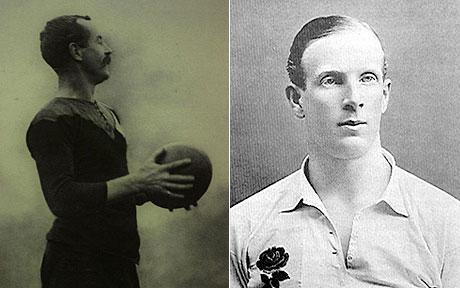Among the international players who also fought for their country was one who was awarded the Victoria Cross and another, an English captain which was considered one of the world’s greatest players.
The project belongs to Nigel McCrery, historian, rugby fan and screenwriter, creator of BBC’s Silent Witness and New Tricks. He has been doing a lot of research through sporting and military archives, as he tried to identify every single player who served in the war and to collect details about their lives and deaths. According to the archives and documents found, 140 international players were killed from England, Wales, Scotland, Ireland, Australia, New Zealand or South Africa. Twenty-one were from France, where the sport had only recently been introduced and one from the United States.
American Lieutenant Frank Gard was a captain for his country during two games against Australia and New Zealand, and died only a couple of months before the end of the war. While most of the English, Scottish and Irish players became officers due to the fact that rugby was played in public schools, a big number of players joined the ranks from Wales, Australia, South Africa and New Zealand.
And so, large numbers of players died during their service. Among them was Lieutenant Ronald Poulton-Palmer, who was captain for England during their 1913-1914 season. Captain Robert Pillman, a flanker, died in July 1916 as he tried to guide his men back after a night raid, during the Battle of the Somme, The New Zealand Herald reports. Lieutenant-Commander Arthur Harrison served as a naval officer in the Battle of Heligoland Bight, In August 1914, in the battle of Dogger Bank, in 1915, in the battle of Jutland in 1916 and in the Zeebrugge Raid, in 1918. He died during the attack and was awarded a posthumous Victoria Cross.
While most of them were killed in action, some died of disease, other killed themselves traumatized by the war; one of them was 2nd Lieutenant Jasper Thomas Brett. The Irish Lieutenant served at Gallipoli and in June 1916 he was diagnosed with shell shock. He killed himself by lying down in front of a train. French Lieutenant Maurice Jean-Paul Boyau became France’s fifth most successful fighter pilot during the war, after scoring 35 victories.
Dave Gallaher, captain of the All Blacks, was also killed in the First World War. He was one of the 13 All Blacks who died and they are often honoured by All Black teams during their tours. Former captain Anton Oliver went to visit the Nine Elms British cemetery in Belgium. “It was a time for reflection, not only for Dave Gallaher, but for all the other . . . New Zealanders who are buried there and all the other soldiers gone but not forgotten,” he said.
‘Into Touch: Rugby Internationals Killed in the Great War’ by Nigel McCrery will be released on February 1 in New Zealand.
